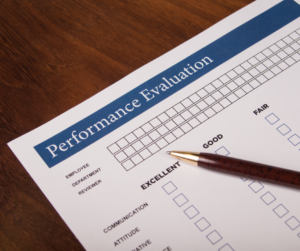 While performance reviews can provide valuable feedback and coaching to an employee, most do not. The keys to a good performance review are consistency, brevity, clarity, and a mutual agreement on the plan going forward. Let’s go over each of these points in more depth.
While performance reviews can provide valuable feedback and coaching to an employee, most do not. The keys to a good performance review are consistency, brevity, clarity, and a mutual agreement on the plan going forward. Let’s go over each of these points in more depth.
Consistency means that, whatever policy you have for timing of reviews, follow it. If you’re going to change the timing for whatever reason, make it known well in advance. If you don’t, your employees will tell their own stories about why you aren’t doing reviews, and their interpretations will almost always be wrong and negative.
I prefer to do reviews quarterly or semiannually. An annual performance review is a year late and will tend to focus on one or two good and bad things without really giving accurate and timely feedback to the employee about what you want. A quarterly review provides for timely feedback so that course corrections can be made if necessary. Conduct reviews in the spirit of coaching. This is an opportunity for you to grow your employees through mentoring. They shouldn’t feel like they’re visiting the principal’s office.
Brevity means make reviews short (fifteen to thirty minutes at the most) and to the point. Don’t go through a long laundry list of personality characteristics that will be graded on a scale of one to five. Realistically that has no impact on the work you need this person to execute in the near future. Instead focus on goals that you mutually set at the beginning of the year, semiannually, or quarterly.
The first time you do performance reviews, sit down with your employees and guide them through goal setting, and what you think will help their careers, the company, and the position or department they’re in.
The second time you do this have employees submit their reviews to you in advance, at least one week prior to your scheduled meeting. Make notes or add comments to their reviews on the same form, and then discuss their comments and yours at the assigned review time. Setting this up as a conversation, not an inquisition, will promote trust and growth
Remember that the key to any behavioral change—which is the only kind of change you can really affect at work—is timely and consistent feedback and coaching. The same principle applies for recognizing desirable behavior: good employees want to know that they’re on the right track and that you appreciate what they’re doing. If they work in a feedback vacuum, they’ll likely stop performing well or they’ll go elsewhere.
Clarity means that when you leave the performance review (coaching session), each of you is crystal clear on the objectives, what was meant by what was said, and the plan for moving forward. Don’t leave the meeting until you’re sure your employee understands all feedback and goals and doesn’t have any lingering questions or thoughts. It’s important that your people feel heard.
Mutual agreement fosters buy-in so your employees are really invested in their own growth and development. If you’re doing performance reviews only to get better performances out of people, forget it. Your people need to know that you’re concerned about their well-being and their personal growth. The benefit to you is that employees who feel like they’re growing will help your company grow. Let your people participate in setting their goals, or even let them come up with the performance goals. In most cases where I’ve seen employers implement this type of goal setting, the employees are much more aggressive than their leaders. It might seem easier just to assign goals, but using goal setting as an opportunity to negotiate and discuss why certain targets are mutually beneficial to the company and the employee has long-term payoffs that dictating objectives never does.
By implementing a methodology of more frequent, brief reviews, you have two to four evaluations in place when it’s time to look at raises. When you look back at those documented reviews, it’s not a mystery to anyone whether your mutually agreed upon goals have been met. If you’ve been clear and concise with your goals there should be no ambiguity about achievement, and the discussion about raises should be fairly simple.
That said, I’m a believer in decoupling pay raises from performance reviews. Every company should have a fair pay policy such that, as long as both individual and company goals are met, an annual, fair, wage increase should be given (usually 2–7%). For exceptional performance, however (a project that was pulled from the fire and rescued, outstanding leadership, etc.), an additional bonus should be awarded.
Once again, though, use your values to guide your pay practices. Is the way you pay your employees consistent with who you are? Are people rewarded fairly for performance? Do you have other incentives (time off, vacations, etc.) that also reward good employees? Make sure you develop a combination of incentives so that the work and the incentive aren’t always about pay.
To reiterate the basic principles of performance reviews: be consistent, brief, clear, and in agreement. You’ll be happy you did.
Excerpted from my book, “Putting Together the Entrepreneurial Puzzle: The Ten Pieces Every Business Needs to Succeed.” Available here on Amazon.
